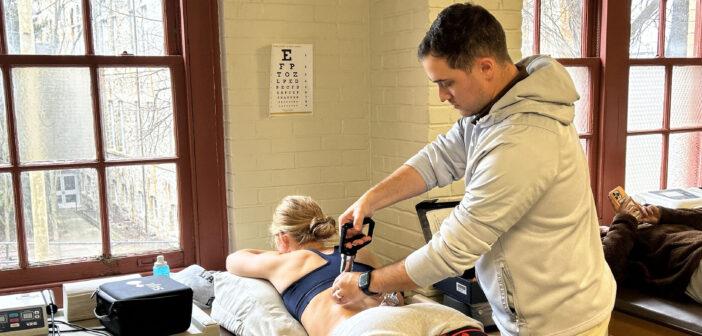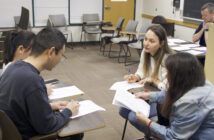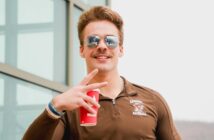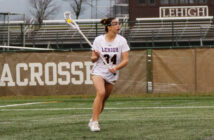Zach VanNostrand suffered a significant injury playing basketball his sophomore year of high school, but without an athletic trainer, he had to find his own way to get diagnosed.
VanNostrand is now an assistant director of sports medicine and cares for the football and women’s lacrosse teams. He’s one of 11 of these trainers, working to create a welcoming environment for injured students to recover and form meaningful relationships.
His individual process of recovery in high school is what kickstarted his interest in how the human body works and moves. This prompted his interest in the service side of the profession, as he could offer the support he once needed as a student-athlete himself.
“We have a great opportunity to improve a pretty s—- situation,” VanNostrand said. “We can take those pretty low points in their life and hopefully, through what we provide, make it pretty positive.”
A trainer’s work goes beyond a purely professional relationship. In many instances, trainers and athletes will develop working friendships.
Spending time together and a mutual love of sports can create a bond and a reciprocal concern for each other’s well-being. These relationships add a more meaningful and rewarding dimension to their work.
“It’s really fun when we have home games and we see a lot of players return after they’ve graduated and left here and we’re able to spend time with them,” Marco Giuliani, associate director of sports medicine who cares for the football and tennis teams, said.
A quarterback from about seven seasons ago came to Giuliani to tell him about how he now has a daughter who is 20 months old. That interaction, Giuliani said, makes him excited to see how his past athletes have grown after their time at Lehigh.
“The most fulfilling part is seeing them arrive as children and graduate as adults,” VanNostrand said. “Just seeing the development as athletes and development as a person and just in general development as a human being is just so rewarding.”
Although these athletic trainers strive for a positive environment, difficult decisions and upsetting situations are far from uncommon.
Their job is to protect the student-athletes, even when that means telling them they are not allowed to play the sport that they have dedicated so much of their lives to.
“As sympathetic as we want to be to the situation, we have to have those hard conversations and make those hard decisions,” Giuliani said. “They may not like us at the time, they may be upset, but we hope that they’ll eventually understand like, ‘hey, they did that for my personal well-being, for my continued success down the road and not thinking about just one day at a time, but they tried to think about the future.’”
George Padezanin, a senior center on the football team, appreciates the athletic trainer’s work and speaks highly of both Giuliani and VanNostrand, especially after his recovery process after tearing his ACL and part of his meniscus.
“Overall the trainers are great at their job, keeping eyes on and coaching everyone up on certain nuances crucial to be able to function properly and get back on the field,” Padezanin said. “Not only are they skilled in their profession but also just awesome people to be around.”






Comment policy
Comments posted to The Brown and White website are reviewed by a moderator before being approved. Incendiary speech or harassing language, including comments targeted at individuals, may be deemed unacceptable and not published. Spam and other soliciting will also be declined.
The Brown and White also reserves the right to not publish entirely anonymous comments.